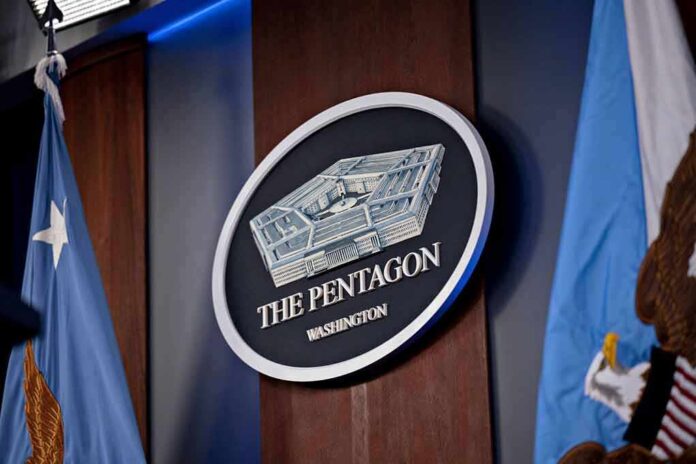Congress moves to ban Chinese drones from U.S. soil as the Pentagon reports over 600 unauthorized flights over military facilities, raising alarms about espionage and potential attacks on American soil.
Key Takeaways
- The House Homeland Security Committee is drafting legislation requiring annual DHS threat assessments on foreign adversaries’ drone capabilities for surveillance and attacks on U.S. soil.
- Chinese drone manufacturers DJI and Autel control nearly 90% of the global drone market, with their products widely used by U.S. law enforcement despite serious national security concerns.
- The Department of Defense reported over 600 unauthorized drone flights above U.S. military facilities between 2022 and 2024, highlighting vulnerabilities in America’s defensive capabilities.
- Recent drone attacks, including one by an Iranian-aligned militia that killed three American servicemembers in Jordan, have demonstrated the evolving threat landscape.
- The House recently passed the National Defense Authorization Act for Fiscal Year 2025, which includes a ban on the sale of DJI drones in the United States.
Chinese Drone Threat Prompts Congressional Action
The House Homeland Security Committee is advancing legislation to counter the growing threat posed by Chinese-manufactured drones operating within U.S. borders. This initiative comes as concerns mount over Beijing’s expanding fleet of militarized drones and their potential for espionage and attacks on American soil. The legislation will require the Department of Homeland Security to produce comprehensive annual threat assessments on the capabilities of foreign adversaries and terrorist networks to deploy drones for surveillance, kinetic strikes, or chemical attacks against U.S. targets.
“Drones are no longer just tools of surveillance, they have become weapons of disruption, sabotage, and intimidation,” said Rep. Carlos Gimenez (R., Fla.), the chairman of the Subcommittee on Transportation and Maritime Security.
Recent military drone deployments have highlighted the strategic threat. China has been increasingly active in Taiwanese airspace with its drone fleet, while a January attack by an Iranian-aligned militia in Jordan killed three American servicemembers. Meanwhile, the Pentagon has documented over 600 unauthorized drone flights above U.S. military installations between 2022 and 2024, raising serious questions about our defensive capabilities and the intentions behind these incursions.
Market Dominance by Chinese Manufacturers Raises National Security Alarms
The legislation addresses a concerning reality in the drone market: Chinese companies DJI and Autel Robotics control approximately 90% of global drone sales. Despite multiple federal warnings about security risks, DJI drones remain widely used by state and local law enforcement agencies across America. Federal agencies including CISA and the FBI have repeatedly cautioned against using Chinese-made drones, citing substantial risks to critical infrastructure and national security.
“DJI and Autel are UAS technology companies headquartered in Shenzhen, China, that control nearly 90 percent of the global UAS market,” said House Committee members
A 2017 alert from Homeland Security Investigations warned that DJI drones might be providing sensitive U.S. infrastructure and law enforcement data directly to the Chinese government. In response to these concerns, the Department of Commerce added DJI to its Entity List in December 2020, restricting U.S. technology exports to the company. The recent National Defense Authorization Act goes further by including provisions to ban the sale of DJI drones in the United States altogether.
Congressional Hearing and Push for Declassification
Rep. Carlos Gimenez has announced a hearing titled “Surveillance, Sabotage, and Strikes: Industry Perspectives on How Drone Warfare Abroad Is Transforming Threats at Home,” scheduled for July 8, 2025. The hearing will feature testimony from drone industry executives and security experts as Congress seeks to understand and address the evolving threat landscape. Of particular concern is the U.S. Coast Guard’s apparent lack of counter-drone capabilities, especially for vessels deployed in the volatile Middle East region.
“It’s no secret that drones are increasingly being weaponized by adversarial nations and terrorist organizations to surveil, sabotage, and disrupt world peace,” Chairman Gimenez said. “As the United States prepares to host high-profile international events, and as our greatest adversaries, Russia, Iran, and Communist China, work to undermine American interests, we must act now. One drone in the wrong hands can threaten lives and cripple critical infrastructure such as air and seaports. This Committee will continue taking proactive steps as drone technology evolves to protect our airspace and ensure the safety of our communities,” said Chairman Gimenez
In a parallel effort, the House Committee is urging the Department of Homeland Security and Department of Energy to declassify information about security risks associated with Chinese-manufactured drones. Sandia National Laboratories has reportedly identified significant national security threats from these devices, and committee members argue that the public interest in understanding these threats outweighs classification concerns. This push for transparency comes as security experts warn about Chinese-owned farmland near U.S. military bases potentially serving as staging grounds for drone surveillance or attacks.
A Growing Threat Requiring Immediate Action
The legislation represents a critical step in addressing what security experts see as a growing vulnerability in America’s defense posture. With Chinese drone manufacturers dominating the global market and evidence mounting of unauthorized drone activity over sensitive U.S. installations, the threat can no longer be ignored. President Trump’s administration previously recognized this danger by placing restrictions on Chinese drone manufacturers, and the current congressional action builds on those early protective measures with more comprehensive prohibitions and security protocols.
“I’m deeply concerned that the U.S. Coast Guard lacks the tools, training, and authority necessary to counter the growing threat of drone warfare,” said Gimenez to the Free Beacon
As drone technology continues to advance and proliferate globally, America faces a critical challenge in securing its airspace and critical infrastructure against these versatile and increasingly weaponized platforms. The proposed legislation represents a necessary step toward addressing a threat that has moved from theoretical to demonstrated, with recent attacks against American forces abroad serving as a sobering reminder of what could happen if this vulnerability remains unaddressed at home.











